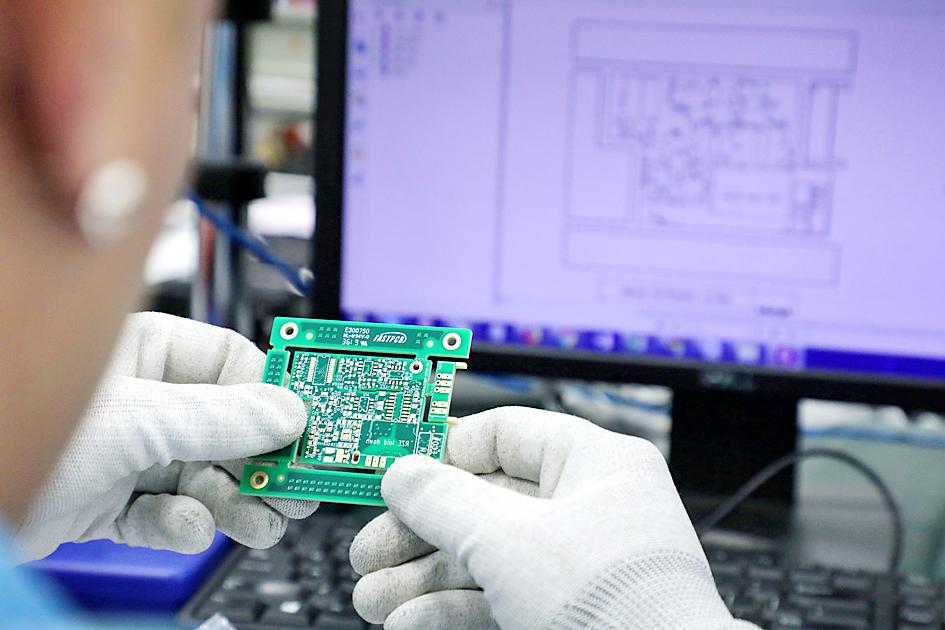Local printed circuit board (PCB) manufacturers are worried that power cuts in China will reduce factory utilization and throttle revenue growth as the industry enters its peak season, the Taiwan Printed Circuit Association (台灣電路板協會) said yesterday.
The warning came as association members expect to be affected by power rationing in China, which has ordered factories to halt operations for seven to 10 days.
Apple Inc supplier Unimicron Technology Corp (欣興電子) on Monday said that its factories in Suzhou and Kunshan in Jiangsu Province were told to stop production from midday on Sunday through tomorrow.

Photo: Reuters
The two cities are manufacturing hubs for Taiwanese PCB makers and face the most stringent electricity curbs.
“It is challenging for PCB suppliers to allocate manufacturing activities, as the industry is entering the peak season, with demand surging ahead of the Christmas shopping season in the US and Europe, and Lunar New Year gift buying China,” the association said.
Some association members plan to ask employees to start a long vacation before China’s National Day holiday on Friday, it said.
Others have proposed cutting utilization to cope with the energy crunch, it said.
Some PCB firms are also in talks with customers to reschedule shipments or to deliver from manufacturing sites outside of China, the association said.
Its members are also concerned about a potential shortage of raw materials and chemicals if upstream suppliers are affected by the power cuts, it said.
That could lead to a decline in factory utilization, it added.
PCB manufacturers are closely watching whether the power crunch would extend into next month and whether the Chinese government would further tighten energy use, it said.
Longer blackouts and stricter rules would threaten PCB companies’ factory utilization and revenue growth, it said.
China is a major production site for Taiwanese multilayer PCB manufacturers, accounting for 37.3 percent of their combined production, association data showed.
Flexible PCBs are next at 26.7 percent, followed by high-density interconnected boards at 19.1 percent, the data showed.
In Taipei trading yesterday, PCB stocks continued to be affected, with Unimicron Technology closing down 0.72 percent at NT$137, Tripod Technology Corp (健鼎科技) falling 1.71 percent to NT$115 and Compeq Manufacturing Co (華通電腦) dropping 1.57 percent to NT$37.6.
That compared with a 1.28 percent decline in the electronic components subindex and the TAIEX’s 0.76 percent loss.

Nvidia Corp chief executive officer Jensen Huang (黃仁勳) on Monday introduced the company’s latest supercomputer platform, featuring six new chips made by Taiwan Semiconductor Manufacturing Co (TSMC, 台積電), saying that it is now “in full production.” “If Vera Rubin is going to be in time for this year, it must be in production by now, and so, today I can tell you that Vera Rubin is in full production,” Huang said during his keynote speech at CES in Las Vegas. The rollout of six concurrent chips for Vera Rubin — the company’s next-generation artificial intelligence (AI) computing platform — marks a strategic

Enhanced tax credits that have helped reduce the cost of health insurance for the vast majority of US Affordable Care Act enrollees expired on Jan.1, cementing higher health costs for millions of Americans at the start of the new year. Democrats forced a 43-day US government shutdown over the issue. Moderate Republicans called for a solution to save their political aspirations this year. US President Donald Trump floated a way out, only to back off after conservative backlash. In the end, no one’s efforts were enough to save the subsidies before their expiration date. A US House of Representatives vote

REVENUE PERFORMANCE: Cloud and network products, and electronic components saw strong increases, while smart consumer electronics and computing products fell Hon Hai Precision Industry Co (鴻海精密) yesterday posted 26.51 percent quarterly growth in revenue for last quarter to NT$2.6 trillion (US$82.44 billion), the strongest on record for the period and above expectations, but the company forecast a slight revenue dip this quarter due to seasonal factors. On an annual basis, revenue last quarter grew 22.07 percent, the company said. Analysts on average estimated about NT$2.4 trillion increase. Hon Hai, which assembles servers for Nvidia Corp and iPhones for Apple Inc, is expanding its capacity in the US, adding artificial intelligence (AI) server production in Wisconsin and Texas, where it operates established campuses. This

US President Donald Trump on Friday blocked US photonics firm HieFo Corp’s US$3 million acquisition of assets in New Jersey-based aerospace and defense specialist Emcore Corp, citing national security and China-related concerns. In an order released by the White House, Trump said HieFo was “controlled by a citizen of the People’s Republic of China” and that its 2024 acquisition of Emcore’s businesses led the US president to believe that it might “take action that threatens to impair the national security of the United States.” The order did not name the person or detail Trump’s concerns. “The Transaction is hereby prohibited,”